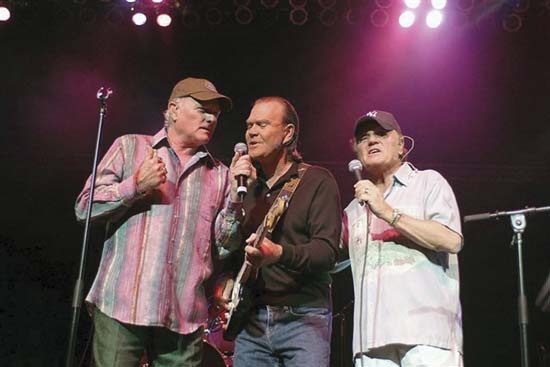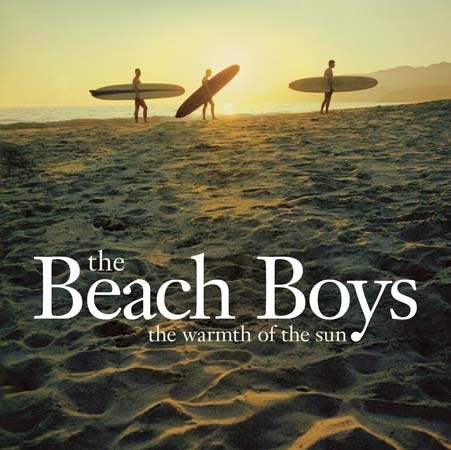Beach Boys, the
American music group
Introduction
American rock group whose dulcet melodies and distinctive vocal mesh defined the 1960s youthful idyll of sun-drenched southern California. The original members were Brian Wilson (b. June 20, 1942, Inglewood, Calif., U.S.), Dennis Wilson (b. Dec. 4, 1944, Inglewood—d. Dec. 28, 1983, Marina del Rey, Calif.), Carl Wilson (b. Dec. 21, 1946, Los Angeles, Calif.—d. Feb. 6, 1998, Los Angeles), Michael Love (b. March 15, 1941, Los Angeles), and Alan Jardine (b. Sept. 3, 1942, Lima, Ohio). Significant later members included David Marks (b. 1948, Newcastle, Pa.) and Bruce Johnston (original name William Baldwin; b. June 24, 1944, Chicago, Ill.). Initially perceived as a potent pop act—celebrants of the surfing and hot rod culture of the Los Angeles Basin during the 1960s—the Beach Boys and lead singer-bassist-producer Brian Wilson later gained greater respect as muses of post-World War II American suburban angst. Notwithstanding sales of 70 million albums, their greatest achievement was their ability to express the bittersweet middle-class aspirations of those who had participated in America's great internal westward movement in the 1920s. The Beach Boys extolled the promise of a fragile California dream that their parents had had to struggle to sustain.
Growing up in suburban Los Angeles (Hawthorne), the Wilson brothers were encouraged by their parents to explore music. Their father, Murry, who operated a small machinery shop, was also a songwriter. While still teenagers, Brian, drummer Dennis, and guitarist Carl joined with cousin Love and friends Jardine and Marks to write and perform pop music in the alloyed spirit of Chuck Berry (Berry, Chuck) and the harmonies-driven Four Freshmen and Four Preps.
Dennis, a novice surfer (surf music) and adolescent habitué of the Manhattan Beach surfing scene, goaded Brian and the rest of the group (then called the Pendletons) into writing songs that glorified the emerging sport. The regional success in 1961 of the Beach Boys' first single, “Surfin',” led in 1962 to their signing as Capitol Records' first rock act. Brian's latent ambitions as a pop composer were unleashed; for years he would write almost all the group's songs, often with collaborators (most frequently Love). The Beach Boys soon appeared on Billboard's U.S. singles charts with such odes to cars and surfing as “409” and “Surfin' Safari,” while their debut album reached number 14. After the commercial triumph of the follow-up album and single, “Surfin' U.S.A.,” in 1963 (the year in which Jardine, back from school, replaced his replacement, Marks), Brian assumed complete artistic control. Their next album, Surfer Girl, was a landmark for the unheard-of studio autonomy he secured from Capitol as writer, arranger, and producer. Redolent of the Four Freshmen but actually inspired by “When You Wish Upon a Star” from Walt Disney (Disney, Walt)'s film Pinocchio (1940), the title track combined a childlike yearning with sophisticated pop poignance. Like his hero, pioneering producer Phil Spector (Spector, Phil), the eccentric Brian proved gifted at crafting eclectic arrangements with crisply evocative rock power (e.g., “Little Deuce Coupe,” “Fun, Fun, Fun,” “I Get Around,” and “Don't Worry Baby”).
 After the first of a series of stress- and drug-related breakdowns in 1964, Brian withdrew from touring and was replaced first by singer-guitarist Glen Campbell, then by veteran surf (surf music) singer-musician Johnston. Brian focused thereafter on the Beach Boys' studio output, surpassing all his role models with his band's masterwork, Pet Sounds (1966). A bittersweet pastiche of songs recalling the pangs of unrequited love and other coming-of-age trials, Pet Sounds was acknowledged by Paul McCartney as the catalyst for the Beatles (Beatles, the)' Sgt. Pepper's Lonely Hearts Club Band (1967). Brian soon eclipsed himself again with “Good Vibrations,” a startlingly prismatic “pocket symphony” that reached number one in the autumn of 1966. His self-confidence stalled, however, when an even more ambitious project called Dumb Angel, then Smile, failed to meet its appointed completion date in December 1966. Exhausted and depressed, Brian went into seclusion as the rest of the band cobbled remains of the abortive album into a tuneful but tentative release titled Smiley Smile (1967).
After the first of a series of stress- and drug-related breakdowns in 1964, Brian withdrew from touring and was replaced first by singer-guitarist Glen Campbell, then by veteran surf (surf music) singer-musician Johnston. Brian focused thereafter on the Beach Boys' studio output, surpassing all his role models with his band's masterwork, Pet Sounds (1966). A bittersweet pastiche of songs recalling the pangs of unrequited love and other coming-of-age trials, Pet Sounds was acknowledged by Paul McCartney as the catalyst for the Beatles (Beatles, the)' Sgt. Pepper's Lonely Hearts Club Band (1967). Brian soon eclipsed himself again with “Good Vibrations,” a startlingly prismatic “pocket symphony” that reached number one in the autumn of 1966. His self-confidence stalled, however, when an even more ambitious project called Dumb Angel, then Smile, failed to meet its appointed completion date in December 1966. Exhausted and depressed, Brian went into seclusion as the rest of the band cobbled remains of the abortive album into a tuneful but tentative release titled Smiley Smile (1967). For the remainder of the decade, the Beach Boys issued records of increasing commercial and musical inconsistency. They departed Capitol amid a legal battle over back royalties and signed with Warner Brothers in 1970. When the splendid Sunflower sold poorly, Brian became a recluse, experimenting with hallucinogens and toiling fitfully while the rest of the group produced several strong but modest-selling albums in the early 1970s. Meanwhile, Endless Summer, a greatest hits compilation, reached number one in the charts in 1974. In 1976 an uneven but commercially successful album, 15 Big Ones, signaled the reemergence of the still drug-plagued Brian. In 1977 Dennis released a critically acclaimed solo album, Pacific Ocean Blue. Despite personal turmoil, the reunited Beach Boys seemed destined for a new artistic peak when Dennis drowned in 1983. The excellent The Beach Boys was released in 1985. In 1988 Brian released a critically acclaimed self-titled solo album, the other Beach Boys had a number one hit with “Kokomo,” and the group was inducted into the Rock and Roll Hall of Fame. In the 1990s the Beach Boys continued to tour and record, with Love continuing his longtime role as the band's business mind. Brian released another solo album (Imagination) and collaborated on albums with Van Dyke Parks (Orange Crate Art) and with his daughters Carnie and Wendy (The Wilsons), who were successful performers in their own right. Carl, who was considered the group's artistic anchor during the turbulent 1970s and '80s, died of cancer in 1998. Later that year the Beach Boys released Endless Harmony, a rarities collection culled from an acclaimed television documentary on the group.
For the remainder of the decade, the Beach Boys issued records of increasing commercial and musical inconsistency. They departed Capitol amid a legal battle over back royalties and signed with Warner Brothers in 1970. When the splendid Sunflower sold poorly, Brian became a recluse, experimenting with hallucinogens and toiling fitfully while the rest of the group produced several strong but modest-selling albums in the early 1970s. Meanwhile, Endless Summer, a greatest hits compilation, reached number one in the charts in 1974. In 1976 an uneven but commercially successful album, 15 Big Ones, signaled the reemergence of the still drug-plagued Brian. In 1977 Dennis released a critically acclaimed solo album, Pacific Ocean Blue. Despite personal turmoil, the reunited Beach Boys seemed destined for a new artistic peak when Dennis drowned in 1983. The excellent The Beach Boys was released in 1985. In 1988 Brian released a critically acclaimed self-titled solo album, the other Beach Boys had a number one hit with “Kokomo,” and the group was inducted into the Rock and Roll Hall of Fame. In the 1990s the Beach Boys continued to tour and record, with Love continuing his longtime role as the band's business mind. Brian released another solo album (Imagination) and collaborated on albums with Van Dyke Parks (Orange Crate Art) and with his daughters Carnie and Wendy (The Wilsons), who were successful performers in their own right. Carl, who was considered the group's artistic anchor during the turbulent 1970s and '80s, died of cancer in 1998. Later that year the Beach Boys released Endless Harmony, a rarities collection culled from an acclaimed television documentary on the group.In 2004 Brian released Gettin' In over My Head, with contributions from Paul McCartney (McCartney, Sir Paul), Eric Clapton (Clapton, Eric), and Elton John (John, Sir Elton). The landmark work of this period in Brian's career, however, was Smile, finally offered to the world as a completed solo album after Brian had spent nearly four decades fine-tuning its sound. He was presented with a Kennedy Center Honor in 2007, and in 2008 he released That Lucky Old Sun, a nostalgic celebration of southern Caliornia made in collaboration with Scott Bennett and Parks.
Ed.
Representative Works
● Surfin' Safari (1962)
● Surfer Girl (1963)
● Pet Sounds (1966)
● Sunflower (1970)
● Endless Harmony Soundtrack (1998)
Additional Reading
David Leaf, The Beach Boys (1985), the first biography, is more reliable and musically astute than a later work by Steven Gaines, Heroes and Villains: The True Story of the Beach Boys (1986, reissued 1995). Timothy White, The Nearest Faraway Place: Brian Wilson, the Beach Boys, and the Southern California Experience (1994), is a comprehensive, more-than-175-year social history of the Beach Boys and their ancestors. Back to the Beach: A Brian Wilson and the Beach Boys Reader (1997), assembles assorted classic articles on the musicians.
- John Talbot, 1st earl of Shrewsbury
- John Talbot Shrewsbury, 1st earl of
- John Taverner
- John Taylor
- John Thaddeus Delane
- John the Apostle, Saint
- John the Baptist, Saint
- John, the Elder Wood
- John the Faster, Saint
- John, the Younger Wood
- John Thomas Whitehead Mitchell
- John Thorp
- John Thurloe
- John Tiptoft, 1st Earl of Worcester
- John Tiptoft Worcester, 1st Earl of
- John T McCutcheon
- John Toland
- John Torrey
- John Tradescant
- John Trumbull
- John Turberville Needham
- John Tyler
- John Tyler: Dorr's Rebellion
- John Tyndall
- John Tzetzes